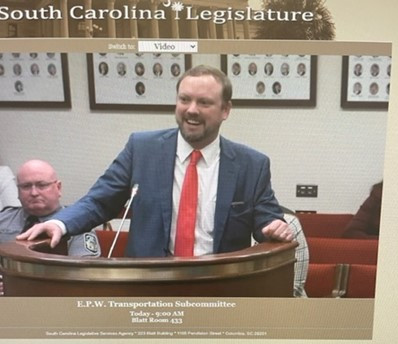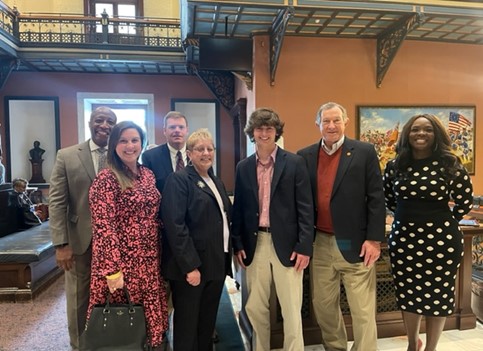This week the Senate finished debating the medical cannabis bill (S.150) while the House continued to move through its calendar. Several bills of interest will be discussed below in this week’s Friday Report.
SCAC will host its Mid-Year Conference on Wednesday, Feb. 23 at the Embassy Suites Hotel in Columbia. NACo will provide an update on ARPA and US Treasury’s Final Rule. County officials will also receive an economic update and information regarding broadband opportunities. Members are encouraged to meet with their delegation members at the State House. A legislative reception will be held at The Palmetto Club that evening from 5-7 p.m. More details are available at the end of this week’s Friday Report.
Also, as a reminder, Statements of Economic Interest (SEI) must be filed with the State Ethics Commission by noon, March 30th.
Revenue, Finance and Economic Development
American Rescue Plan Act (ARPA) – State Authorizations – H.4408. The House Ways and Means Committee met this week on several bills including H. 4408, dealing with the state’s share of ARPA funds. This legislation would provide over $453 million in funding to SCDOT, $400 million to the State Broadband Office to expand access to high-speed broadband internet, $100 million to the Office of Resilience, and $800 million to the South Carolina Rural Infrastructure Authority (RIA) for three separate grant programs regarding water, wastewater, and stormwater projects. The RIA grants would provide local governments with opportunities to build and update aging infrastructure across the state. Additionally, the RIA would be required to transfer $500,000 to each of the 10 Council of Governments for planning assistance, development of grant proposals, and compliance assistance related to improvements in water, wastewater, and storm water infrastructure for smaller systems. H.4408 received a favorable report as amended and is now pending a second reading on the House calendar.
Savannah River Site Settlement Funds – S. 956. This legislation would appropriate the $525 million that the state received from the Savannah River Settlement (SRS) to the “SRS Settlement Account” that will be housed under the Department of Administration. Under the Senate’s proposal, 65 percent ($341 million) would be sent to the “primary” counties affected by the lawsuit which include Aiken, Barnwell, and Allendale. Ten percent ($52 million) would go to “perimeter” counties also affected including Bamberg, Colleton, Edgefield, Hampton, Lexington, Orangeburg, and Saluda. The remaining 25 percent ($131 million) would be sent to the County Transportation Committees (CTCs) in all counties except the three counties that were deemed “primary.” These funds would be distributed under the existing CTC funding formula.
Counties deemed either “primary” or “perimeter” under the legislation would be required to submit a written request for the funds to the Department of Administration’s Executive Budget Office (EBO). The appropriations may then be released to the county to fund an eligible project at the direction of the EBO following the receipt of the written request and subject to approval by the Joint Bond Review Committee. S. 956 received a favorable report as amended and is pending a second reading on the Senate calendar.
View a complete list of the eligible projects.
Motor Vehicle Registration – H. 4151. This bill would change the current biennial registration of motor vehicles to annual registration with all counties eventually issuing revalidation decals and license plates, an SCAC policy position. SCAC staff testified in favor of H. 4151, but a House Education and Public Works subcommittee adjourned debate on the bill due to its fiscal impact on the State Infrastructure Bank (SIB). SCAC staff plans to work with the bill’s sponsor to find a way to lessen the financial burden on the SIB.
 |  | |
| Assistant Director of Governmental Affairs Owen McBride testified before a House Education and Public Works subcommittee. | SCAC Staff members met with members of South Carolina Auditors, Treasurers and Tax Collectors (SCATT) who were at the statehouse to discuss legislation. |
Public Safety, Corrections and Judicial
Medical Cannabis – S. 150. As initially drafted, this bill would enact the “SC Compassionate Care Act” which would create a regulated medical cannabis program to allow individuals with serious illnesses to access and use medical cannabis when recommended by a physician. SCAC’s policy position is to oppose the legalization of medicinal cannabis due to the lack of FDA approval.
After several weeks of contentious debate, the Senate adopted several amendments which impose the following conditions:
- Provides that an employer is not required to make accommodations to allow an employee to use medical cannabis. An employer may also discipline or terminate an employee for being under the influence of medical cannabis while at work;
- Provides that localities may regulate the locations, hours, and number of medical cannabis businesses or prohibit medical cannabis establishments from operating in the jurisdiction;
- Establishes a system where cannabis establishment applicants must meet certain conditions, and in cases in which more applicants apply than are allowed by the local government, the local government shall follow the preference analysis procedure established by the Department of Health and Environmental Control (DHEC);
- Imposes a 6 percent sales tax at the point of sale that will also be subject to any applicable local option sales tax enacted pursuant to Chapter 10 of Title 4;
- Provides that, in order to be licensed as a medical cannabis establishment, the establishment principal applicant shall submit to DHEC a completed electronic application signed by each principal and a copy of any local registration, license, or permit required by local government for the proposed medical cannabis establishment;
- Provides that the provisions of this legislation will sunset on December 31, 2028.
S. 150 was given third reading as amended and has been sent to the House.
County Government and Intergovernmental
State Election Commission – H. 3444. This legislation would require all counties to follow the uniform election practices created by the State Election Commission (SEC). To accomplish this, H. 3444 would provide the SEC with the authority to supervise and standardize the practices of local county election offices. It would also give the SEC and its executive director the power to supervise and standardize the performance, conduct, and practices of the county board of elections and voter registration and to promulgate regulations to effectuate this new authority. After the Senate amended the bill and sent it back to the House, the House adopted several significant additional amendments. As amended by the House, H. 3444 would:
- Eliminate the use of absentee ballot boxes. Completed absentee ballots must be mailed or delivered personally to the county board of voter registration and elections.
- Abolish municipal election commissions and devolve those responsibilities and functions to the appropriate county boards of voter registration and elections. The amendment did not discuss how these additional responsibilities on county boards of voter registration and elections would be funded.
- Establish methods of auditing election results that must be reported on the State Election Commission’s website.
The House then sent H. 3444 as amended back to the Senate and the Senate recommitted the bill to the Senate Judiciary Committee.
SCAC's Mid-Year Conference and Institute of Government Classes
SCAC's 2022 Mid-Year Conference will be held Wednesday, February 23, 2022, at the Embassy Suites Hotel in Columbia. You can access a copy of the registration brochure and conference agenda on the Association’s website. A legislative reception will be held from 5:00-7:00 p.m. at the Palmetto Club. You are encouraged to invite your legislators to dinner while you are in Columbia.
The Institute of Government will be held in conjunction with the Mid-Year Conference on Thursday, February 24, and Friday, February 25. The specific schedule of course offerings is available on the association’s website. The Council Chairperson’s Workshop will be held on Thursday, February 24, from 1:00-4:00 p.m. and is open only to council chairs and vice chairs. It is offered free-of-charge, but registration is required. Should you or your council members need assistance determining which classes to take, please contact Ryan Tooley at (800) 922-6081 or at rtooley@scac.sc.
The conference and Institute registration deadline is February 17.
Newly-Introduced Legislation
View/Download Full Text for Newly-Introduced Legislation
Note: If you would like to offer comments to the SCAC staff, please call us toll-free at 1-800-922-6081, fax to (803) 252-0379, or send an email. You can also go to www.scstatehouse.gov and click on "Legislation," then "Introduced Legislation."
Senate Bills
S. 1049 — Prohibits the emission of air contaminants from a regulated source that creates a nuisance.
S. 1051 — Prohibits DHEC from issuing any permit for the construction of a solid waste management facility or for mining activities, respectively, if located within a certain proximity to a public park or other public natural area.
S. 1052 — Provides that certain emergency medical services personnel may be covered under the South Carolina Police Officers Retirement System.
S. 1054 — Provides that a towing company, storage facility, garage, or repair shop may apply to certain vendors to obtain real-time access to title and lienholder information before towed vehicles are sold.
S. 1062 — Provides that the special veterans drivers license designation is available to Veterans of the United States Public Health Service Commissioned Corps and Veterans of the National Oceanic and Atmospheric Administration Commissioned Officer Corps.
S. 1063 — Provides that persons who have been wrongfully convicted of and imprisoned for a crime may recover the monetary value of the loss sustained through the wrongful conviction and imprisonment.
S. 1066 — Enacts the "Youth Protection from Internet Pornography Act".
House Bills
H. 4940 — Enacts the "Uniform Child Abduction Prevention Act".
H. 4941 — Requires vaccine administrators to obtain written informed consent before administering a COVID-19 vaccination to a person and creates criminal penalties.
H. 4942 — Requires vaccine administrators to obtain written informed consent before administering a COVID-19 vaccination to a person and provides for the appropriation of related funding.
H. 4943 — Allows for the use of revenues from any impact fees to pay down indebtedness for system improvements.
H. 4945 — Repeals Section 56-3-645 relating to road use fees imposed upon motor vehicles powered by electricity, hydrogen, any fuel other than motor fuel, or a combination of motor fuel and any fuel other than motor fuel.
H. 4946 — Places certain conditions on the manner in which eligibility for certain sales tax exemptions are determined.
H. 4948 — Restructures the circumstances under which photographs and videos of an autopsy may be disseminated.
H. 4949 — Allows magistrates to issue ex parte orders of protection in certain circumstances.
H. 4956 — Requires a portion of the deed recording fee to be credited to the South Carolina Conservation Bank Trust Fund.
H. 4957 — Enacts the "Election Integrity Act".